Best HVAC CRM Software: Our 6 Picks for 2025

Table of Contents
- What Is a HVAC CRM System?
- What Criteria We Used to Evaluate the CRM Software For HVAC Businesses
- Comparison Table: 6 Top HVAC CRM Software
- When to Invest in a CRM Software for Your HVAC Company?
- How to Choose the HVAC CRM that Best Fits You
- How do I get customers with an HVAC CRM Software?
- The Future of HVAC CRM: What’s Next?
- A CRM is an Investment in Your Business
- FAQs about HVAC CRM Software
The HVAC industry is a cornerstone of modern life, a market valued at over $129 billion annually in the U.S. alone. For any HVAC professional, running a successful business goes beyond just fixing a faulty air conditioner. It comes down to managing customer relationships, streamlining business operations, and positioning your company for long-term growth.
This is where a robust CRM system becomes a game-changer. A CRM is one of the smartest investments you can make, acting as the engine that helps you manage customer relationships, boost productivity, and build a profitable business for years to come.
This guide breaks down the best HVAC CRM platforms for 2025, including:
- The seven best HVAC field service CRM platforms for 2025
- Their features, pricing and ideal use cases
- When to invest in a CRM system
- How to choose
We’ll help you find a solution that not only meets your current needs but also helps in growing your HVAC business for years to come.
What Is a HVAC CRM System?

Source: Freepik
A CRM (Customer Relationship Management) system is a powerful management tool that helps HVAC companies handle every aspect of their customer interaction. From the first point of contact with potential customers to scheduling maintenance for existing clients, a CRM centralizes your customer data, automates tasks, and gives you a clear overview of your entire sales process.
By centralizing all your client data and automating routine tasks, a CRM frees up your time to focus on keeping your customers happy and their homes comfortable.
For those just starting out, see our How To Start Your Own HVAC Business: Step-by-Step Guide.

What Criteria We Used to Evaluate the CRM Software For HVAC Businesses
To make this list as useful and impartial as possible, we evaluated each platform on several factors:
- overall feature set
- ease of use
- mobile accessibility
- integration with other business tools
- reporting and analytics capabilities
- customer support quality
- and cost-effectiveness.
We also considered whether the CRM could scale with a growing HVAC business and how well it supports technicians in the field.
Let’s get into it!
1. Nutshell: The All-in-One CRM for Small Businesses
Nutshell stands out as an easy-to-use and affordable CRM, ideal for smaller HVAC contractors and growing businesses. Unlike other platforms built for enterprise-level operations, Nutshell is designed to get you up and running quickly without a steep learning curve. It provides a comprehensive suite of features that combine HVAC marketing and sales automation in one tool.
- Key Features: Centralized contact management, automated follow-up emails, lead tracking, multiple pipeline views (including map view), and a strong mobile app for field technicians.
- Pricing: Starts at around $13/user/month (annual billing).
- Best For: Small to mid-sized HVAC companies that want an affordable all-in-one CRM.
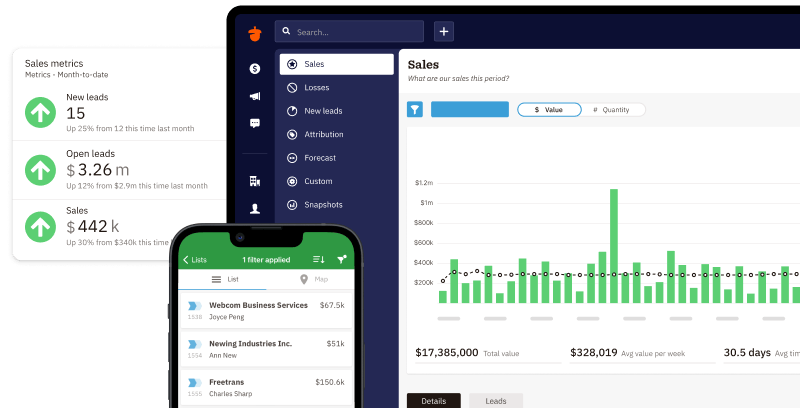
Source: Nutshell
2. Service Titan: The Industry Leader for Enterprise Growth
Often considered the “gold standard” in HVAC CRM software, Service Titan is a powerful and comprehensive platform for growing your HVAC business. It is an all-in-one solution that includes everything from call booking and dispatching to integrated payroll and advanced business analytics.
- Key Features: Service Titan provides a massive feature set that covers every aspect including booking, dispatching, integrated payroll, commission tracking, advanced reporting, and field-based estimate building.
- Pricing: $250–$500+/month per technician.
- Best For: Large HVAC companies needing a feature-rich, scalable CRM.
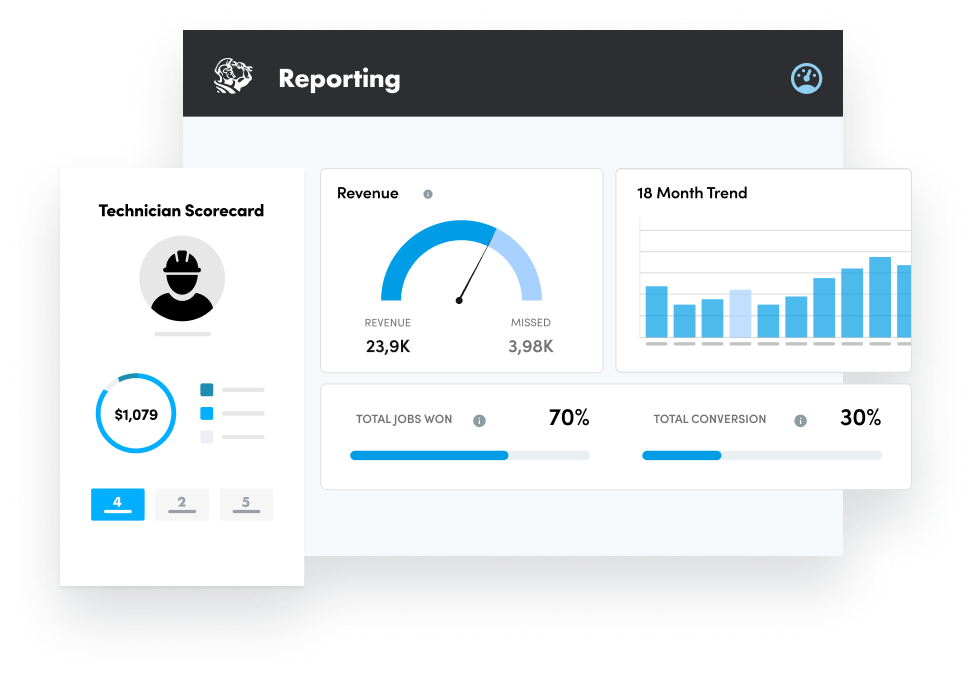
Source: Service Titan
Running your own HVAC company? Get paid faster with Invoice Fly’s Invoice Maker — it’s free!
3. Kickserv: A Budget-Friendly Option with a Free Plan
Kickserv is a great entry-level option for small teams or a one-man show getting started in the hvac industry. It provides essential tools for managing jobs, customers, and invoices, all within a straightforward interface.
- Key Features: Estimating, job management, invoicing, and a mobile app for time tracking and job details.
- Pricing: Free for up to two users; paid plans start at $19/month.
- Best For: New contractors or one-person operations.
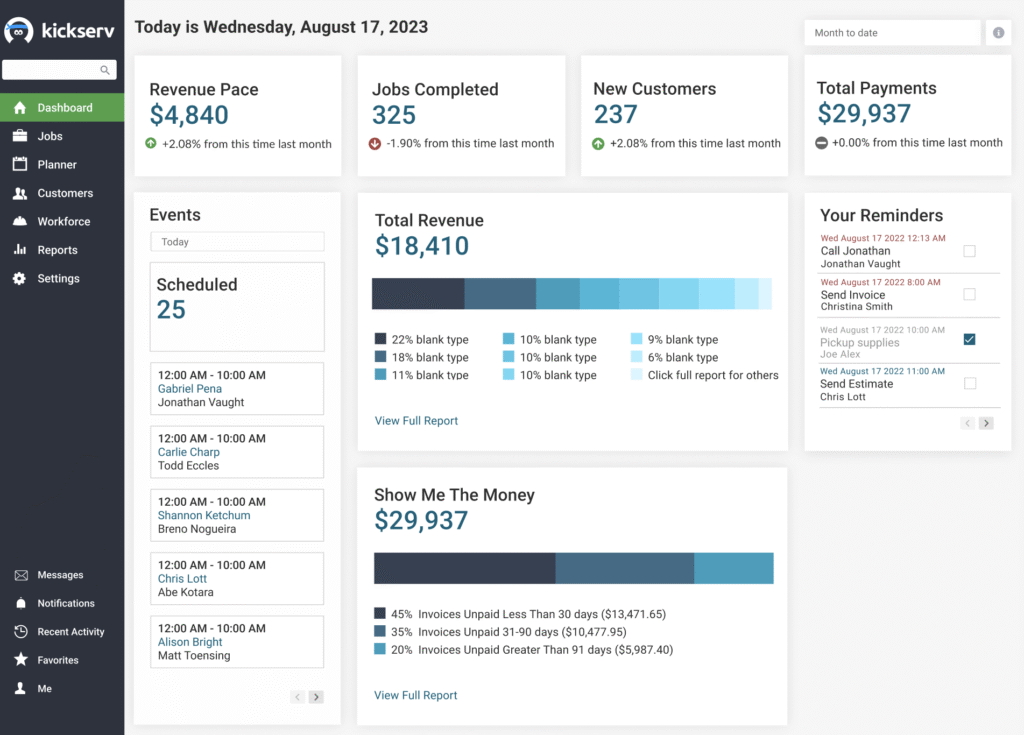
Source: Kickserv
4. Service by WorkWave: Field-First Efficiency
As a field service management system, Service by WorkWave focuses on helping HVAC professionals streamline their on-the-go operations. The platform is designed to improve productivity and efficiency for technicians, ensuring they have all the information they need to complete jobs successfully.
- Key Features: Drag-and-drop scheduling, route optimization, real-time job updates, billing, and payments.
- Pricing: Custom quote only.
- Best For: HVAC companies prioritizing mobile-first field management.
Source: WorkWave
Check out our Average HVAC Salary Guide for Technicians in 2025 to see how pay varies in the industry.
5. Aptora: The Accountant’s Choice for Contractors
Aptora’s Total Office Manager is a unique offering that combines a full-featured CRM with comprehensive accounting and business operation management tools. This makes it an excellent choice for hvac business owners who want to handle everything from payroll to job costing within a single platform.
- Key Features: Inventory tracking, certified payroll, warehouse management, dispatch board, and reporting.
- Pricing: Plans start at $700/month.
- Best For: Established companies that want one system for both operations and accounting.
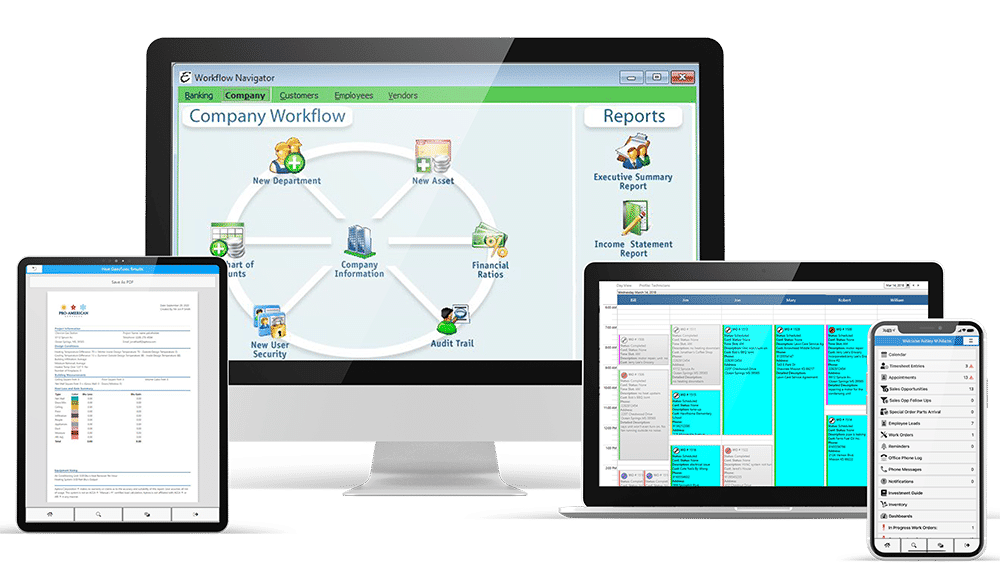
Source: Aptora
6. Simpro: Project Management and Efficiency
Simpro is a highly versatile field service management system that is popular across various trades, including HVAC. It is known for its ability to manage the entire workflow from quoting and scheduling to invoicing and maintenance.
- Key Features: End-to-end project management, cost tracking, real-time updates, quoting, and scheduling.
- Pricing: Custom quote only.
- Best For: Companies balancing day-to-day HVAC service and larger project work.
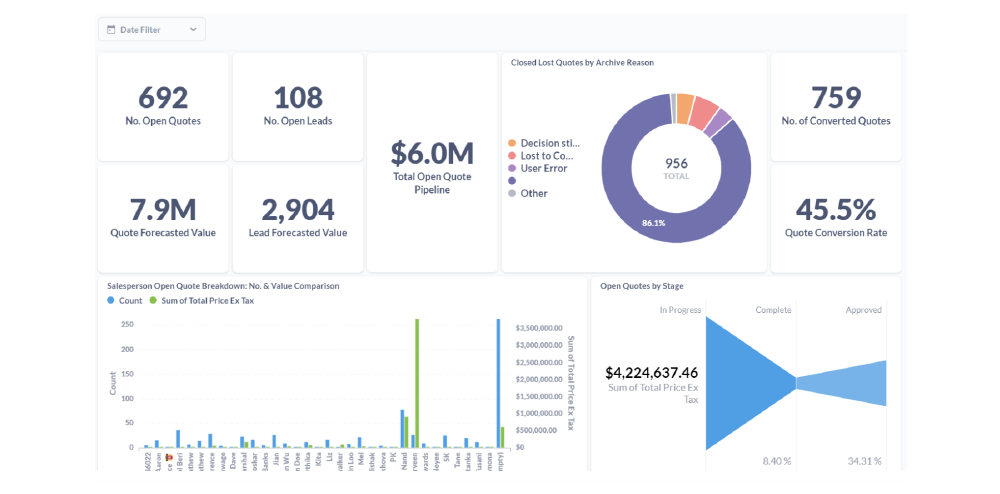
Source: Simpro Group
If you’re new to the industry, see How to Get your HVAC License for licensing requirements.
Comparison Table: 6 Top HVAC CRM Software
| CRM Platform | Best For | Standout Feature | Pricing |
| Nutshell | Small to Mid-Sized Businesses | Sales Automation & Marketing | Starts at $13/user/month (annual billing) |
| Service Titan | Large Enterprises | Comprehensive All-in-One Suite | Custom Quote (Known to be high) |
| Kickserv | Small & Startup Businesses | Affordable with Free Plan | Starts at $19/month (paid plans) |
| WorkWave | Mobile-First Teams | Field Dispatching & Tracking | Custom Quote |
| Aptora | Finance-Focused Operations | Integrated Accounting & Payroll | Starts at $700/month (hosted) |
| Simpro | Mixed Service & Project Work | End-to-End Project Management | Custom Quote |
For protecting your business finances, read HVAC Contractor Insurance: How to Choose the Right Coverage & Save in 2025.
When to Invest in a CRM Software for Your HVAC Company?
If your HVAC company is juggling too many spreadsheets, losing track of customer data, or struggling with scheduling and follow-ups, it’s time to consider a CRM. Investing in CRM software becomes essential when you want to grow your customer base, improve efficiency, and deliver consistent service across all jobs.
How to Choose the HVAC CRM that Best Fits You
When selecting a CRM, focus on what will actually move the needle for your team today and scale with you tomorrow.
Data storage and collection
Your CRM should securely capture and organize all customer, job, and asset data from contact information and service history to estimates, invoices, and photos and make it accessible in real time across web and mobile devices.
Benefits of the platform
To ensure a strong ROI, evaluate these capabilities:
Ease of use
A clean, intuitive interface shortens onboarding and helps techs and office staff adopt the system quickly with minimal training.
Automation
Automate routine tasks like follow‑ups, maintenance reminders, scheduling, and invoicing so your team spends more time serving customers and less time on admin.
Sales process management
Get full pipeline visibility from lead capture to won jobs, with estimates, approvals, and upsells tracked in one place.
Analytics and reporting
Use dashboards and custom reports to monitor profitability, technician performance, close rates, and customer trends. And more importantly make data‑driven decisions.
Mobile App
Field technicians need reliable mobile access to work orders, customer notes, checklists, photos, and signatures, ideally with offline mode and GPS.
Training and support
Look for robust onboarding, tutorials, and responsive support (chat/phone/email) so issues don’t stall your operations.
Capterra / G2 / Get App Industry Software Reviews
Validate vendor claims by checking ratings and HVAC‑specific reviews from contractors who use the software day to day.
How do I get customers with an HVAC CRM Software?
An HVAC CRM helps you attract and keep customers by automating key processes and centralizing all client information. It allows you to:
- Capture and track leads: Automatically collects and organizes inquiries from various sources, helping you identify which marketing efforts are working.
- Improve communication: Sends automated follow-up messages to new leads and personalized offers to existing clients, boosting conversion and retention.
- Organize operations: Manages scheduling, estimates, and invoicing, freeing up your time and improving efficiency.
- Build a strong reputation: Automates requests for customer reviews, which helps attract new clients through positive word-of-mouth.
For pricing strategy, see our HVAC Pricing Guide: How to Charge Confidently. For upsell ideas, read Best HVAC Service List To Offer To Your Customers in 2025.
The Future of HVAC CRM: What’s Next?

Source: Freepik
The future of HVAC CRM will be driven by technology that enhances efficiency and customer experience.
- AI Integration: Artificial intelligence will be increasingly used to predict customer needs, automate lead scoring, and help technicians with troubleshooting in the field.
- Smarter Systems: CRMs will connect with smart HVAC systems to get real-time data, enabling proactive maintenance and improved service.
- Enhanced Customer Experience: The focus will shift to providing a seamless customer journey, with the CRM serving as the central tool for managing personalized and efficient interactions.
For marketing insights, check our HVAC Marketing Strategy: Increase Marketing Profits in 2025.

A CRM is an Investment in Your Business
Choosing the right HVAC CRM software is one of the most important decisions you can make to set your business up for long-term success. It’s not just a tool for tracking leads or scheduling jobs; it’s a strategic investment that helps you manage customers, increase productivity, and build a thriving, profitable business.
By centralizing your customer data, automating routine tasks, and giving you the insights to make smart decisions, a CRM can free up your time to focus on what matters most: keeping your customers home comfortable and building a strong reputation.
Running your own contracting business? Try Invoice Fly’s Invoicing Software or Invoice Maker today.
FAQs about HVAC CRM Software
The best CRM for HVAC depends on your business size and needs. Tools like Service Titan are popular for large enterprises, while Nutshell and Kickserv are more affordable for smaller contractors. Each option comes with unique strengths in automation, scheduling, and customer management.
A CRM in HVAC is a Customer Relationship Management system designed specifically for HVAC contractors. It centralizes customer data, streamlines scheduling and dispatching, automates follow-ups, and provides analytics to improve business operations.
Among HVAC companies, Service Titan is one of the most commonly used CRM platforms, especially for larger organizations. For small to mid-sized businesses, Kickserv and Nutshell are widely adopted due to their affordability and ease of use.
HVAC contractors can choose from specialized CRM platforms such as Service Trade, Simpro, or Aptora, depending on whether they prioritize field service, project management, or accounting integration. The right software should fit your workflow, budget, and growth plans.
For HVAC businesses looking for simplicity, Kickserv is often considered the easiest to use because of its free plan and straightforward interface. Nutshell is also praised for its intuitive design and minimal onboarding time.
